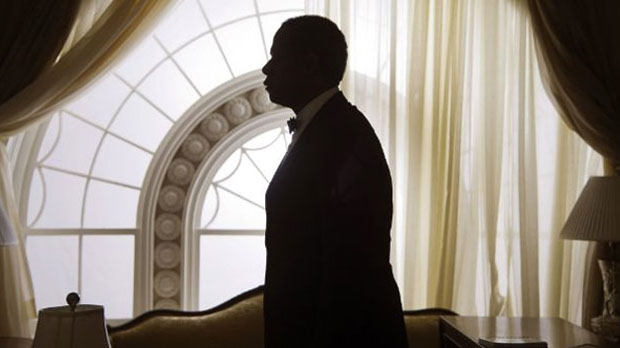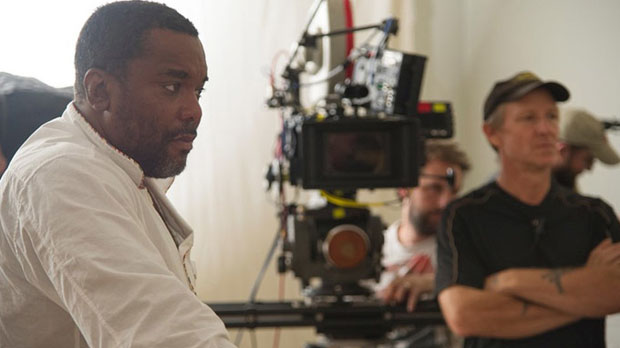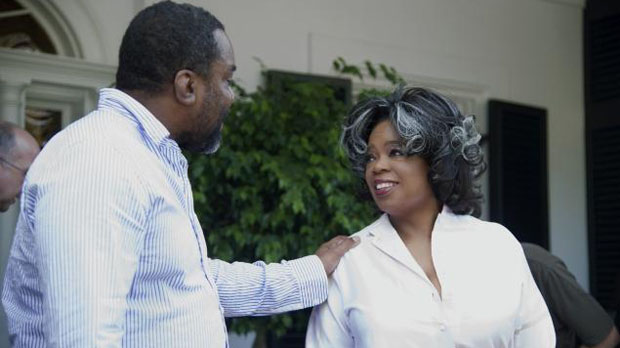 Back to selection
Back to selection
How Lee Daniels Made The Butler His Own
 Lee Daniels' The Butler
Lee Daniels' The Butler When it comes to the hubbub, headlines, and advertising that predated the release of Lee Daniels’ The Butler, it’s best that you forget what you’ve heard, barring whatever thoughtful reviews or interviews you’ve come across. A decades-spanning epic primed and packaged for awards buzz, the film has been sold as a rather generic historical saga — the kind of “important” Oscar bait whose trailer comes with the requisite sweeping score. In short, the movie, a Weinstein Company release, has been Weinstein-ized to a fault. There’s even the title debate that put producer Harvey Weinstein at the forefront, and saw him spar with Warner Bros. over an MPAA claim, which contested that calling the new film The Butler would conflict with a 1916 Warner silent short of the same name. Whatever valiance may have been present in Weinstein’s efforts, it was tough to shake the sense that some of the controversy was about drumming up publicity, and amid all of this, there was the grating feeling that the movie was a mere product of studio puppeteering, when, in fact, it was the vital work of an unflinching auteur.
Lee Daniels’ The Butler has already drawn comparisons to Forrest Gump, as its protagonist, White House butler Cecil Gaines (Forest Whitaker), whose story is based on that of real-life Washington Post profile subject Eugene Allen, serves as audience proxy as he witnesses U.S. history through the pivotal terms of five presidents (the movie begins with Eisenhower’s tenure and spans through the Reagan era). But this is not like any historical epic you’ve seen before, and, while screenwriter Danny Strong brings his knack for plumbing Washington’s inner-workings, that’s virtually all because of Daniels. Everything that makes this drama so profoundly effective can be traced back to its director, from the pistol-bang of an opener and the horrifying depiction of hate crimes to the ember-hot aura inside Cecil’s home and the stunning performances drawn from Oprah Winfrey and David Oyelowo, who play Cecil’s wife, Gloria, and his Freedom-Rider-turned-Black-Panther son, Louis. The film is noteworthy because it’s told from the black perspective and has a black director at the helm. It’s essential because that director is one who takes the same fearless approach in showing a young female protester (Yaya Alafia) getting spit on as he did in showing a monstrous mother push her daughter and granddaughter down the stairs (in Precious). He makes vivid and raw the tough facts that Hollywood has glazed over for years.
“What’s exciting about Lee is he is a truth-seeker,” Winfrey recently told me at the Butler press conference. “He will literally not let any of his actors get away with a breath that’s a false moment. And I can testify to that, because he pulled me over to the monitor one day [during production], and he said, ‘You see how you’re leaning in there? And you took that breath? Drop the breath. I don’t want to hear it, I don’t want to see it.’ In every moment, he doesn’t allow you, as an actor, to get away with anything that even remotely appears to be fake. And if he does, he’ll start yelling, ‘Fake!’”
Meeting me in a suite at the Waldorf Astoria, Daniels is as passionate and animated as his actors describe him to be. Instead of just sitting on the couch opposite me, he sprawls across it on his stomach and hugs a pillow, before shifting positions at least five more times. He shouts. He tears up. He comes close to, in his words, a “breakdown.” And in between, he charts how a movie about a father (Cecil) and a son (Louis), whose opposing choices lovingly reflect the layered and varied experience of blacks in this country, morphed into something grander, something that even uses its episodic structure to its advantage (that JFK and MLK Jr.’s deaths appear in succession only underscores how a community struggled on while its promising heroes were repeatedly slain). “This film is bigger than me,” Daniels says, unconsciously evoking Halle Berry’s watershed acceptance speech from 2002, when she won the Best Actress Oscar for, incidentally, Monster’s Ball, a movie Daniels produced. The filmmaker goes on to outline the calculated and unexpected things that brought The Butler into being, and his surprising feelings about the eventual — and very apt — title of the film, a film that, in the end, is one of the most important movies ever made about black history in America.

Filmmaker: There’s a powerful and telling quote in this film about how the black help, historically, may seem subservient but are actually subversive, and I couldn’t help but relate the point to how this movie may be perceived versus what it truly is. You’ve subverted typical, studio-imposed limitations to make something rich and unapologetic. So, to start, can you just offer some thoughts on the quote?
Daniels: I come from a family of help. I don’t know many African-Americans who don’t. And I think that from the beginning of our existence here, as African-Americans, we were help, and we got kids to trust us. Many women did, at least — and still do, as nannies. Most of my white friends have better relationships with their nannies than they do with their mothers. It’s just the history of America. And I think that I completely understood that moment you’re talking about, with Louis being embarrassed about the help, and his father. There were several moments where I was embarrassed that my mother had to do this, not realizing that she was doing her thing in a way that was…oh God, now I’m going to get emotional.
Filmmaker: Feel free to get emotional…
Daniels: [Laughs] You know, I hate this movie! I told Oprah, “I can’t take this movie.” It addresses issues that are so deep and profound on so many levels. I’ve not had a breakdown yet, but this is as close I’ve come to having one. Because I have to try to understand the “whys.” Why did I make the fuckin’ movie? Why this movie?
Filmmaker: Well, why did you?
Daniels: I didn’t start out making this movie. This movie started out as a father and son story. I wasn’t excited about my relationship with my father, and I’m not excited about my relationship with my son, and I thought that was universal — the father and son thing. It’s a love story. And it wasn’t until I started telling the story that I started realizing the sort of points you’re making right now, like about the quote, for example.
Filmmaker: The whole title debacle seemed to distract from the fact that there was an artist at work making this movie, and that’s why, for me, what the title ultimately became seems very appropriate. Though the projects are vastly different, it’s basically the flip-side of what recently happened with M. Night Shyamalan, whose name was basically removed from the marketing of After Earth. How do you feel about all this, and about authorship in film promotion?
Daniels: I’ve got a problem with it. The thing is, you might be in the know, and understand the politics behind, like, the MPAA rule-down on “Lee Daniels’ The Butler.” But I want kids to see this movie in Oklahoma. As a filmmaker, I want people to see my shit. And if people are thinking that I’m arrogant or something…you know, I’m not Scorsese. Yet. [Laughs]
Filmmaker: So you’re not happy about how the title situation turned out?
Daniels: I don’t know that I am. I don’t know that I’m crazy about the idea of having my name on the front of this. I just finished the movie. And I’m still trying to wrap my head around all this right now. When I’m doing a movie, I’m in a cocoon. I’m making something. I’m making a baby. And when I’m in it, my kids don’t want to fuck with me because I haven’t been there for them, I’ve gained weight, I haven’t taken care of myself, my boyfriend’s not speaking to me. It’s all about giving birth to this thing. So when I come out of it, and I’m dealing with this title thing, I’m wrapping my head around it and I don’t know how I feel about it. I don’t like someone telling me what the title of my film is going to be. I know that’s probably not what you want to hear, but it just comes down to: Don’t tell me what my title’s going to be. It’s my movie.
Filmmaker: Well, on that note, there are a lot of things here that made the movie identifiable as a Lee Daniels film.
Daniels: Okay. [Laughs] Oh, God…
Filmmaker: First of all, you don’t waste time establishing that this isn’t going to be an easy ride. The opening image is this baroque, interior shot of the White House, but then we flash back to the past, on the plantation where Cecil was a boy, and we have Mariah Carey’s character getting raped, Cecil’s father getting shot, and Vanessa Redgrave’s character using the N-word. So we’re pretty deep in Lee Daniels territory from the get-go.
Daniels: Yeah, I wrote that. That beginning is something that I put in. Because it was all stuff that my great aunt had told me, and that my dad had told me. It was a combination, a hodgepodge, of information that was given to me from different relatives. And why should I not be relentless in telling what it is that happened? It happened.
Filmmaker: That just speaks to the whole tone of this movie. It’s the antithesis to so many popular films that we typically see about black history, which almost always seem to exist to make certain white people feel better about terrible things that have happened.
Daniels: Well, that’s because they were made by white filmmakers.
Filmmaker: And that’s part of my point. This movie isn’t interested in sugarcoating anything, and I wanted to talk, specifically, about some of the violent scenes that take place during the civil rights movement, like the scene in the diner, with the spitting, and the scene on the bus in Alabama. Were those difficult to shoot? Logistically and emotionally?
Daniels: Yeah. We were in the bus, and that was the hardest scene to shoot — the bus scene. Logistically, it was a nightmare. I’m in a bus! And it’s hot, and the bus was a real bus from the period. So, no air conditioning. And it wasn’t until I shot that scene that I realized, like I said before, that we were onto something else. We were in the bus, and I’m yelling, “Action!” and from out of nowhere, the KKK members are coming out, and the crosses are up, and it’s scary. Because I’m in the bus, with the kids, these actors. And I yell, “Cut,” and [the people outside] can’t hear me, because the windows are up, so they keep coming. And they’re shaking the bus. And at that moment, I said, “Oh fuck. This is what this was like. This is what they went through.” Those kids, both white and black, were heroes.
Filmmaker: At a certain point I felt like The Paperboy could be happening somewhere else, simultaneously with this story, and I guess, hypothetically, given the era, it was. But the main reason I say that is because we see a familiar visual texture here — the soft amber light, the superimposition. Is there a way you tend to define your visual style?
Daniels: Well, it’s about a mood. I’m a sexual person, so I’m aroused by color, and texture. And I think that under it all, there is some sort of tone that should titillate you in some way. If it’s not titillating you or making you feel something, then I’m not doing my job.
Filmmaker: There’s also a graininess, which we’ve seen from you before. Here, it looks to appear in archival footage and new footage as well.
Daniels: Correct. That was a specific choice, and a hard choice. I was so nervous that it was going to look like one of those TV movies, you know? So, if you watch the film again, you’ll see that there was a clear choice to marry the stock footage to the footage that we shot. I worked with Andrew Dunn [Daniels’ d.p. on Precious], and the scenes before the stock footage are sort of grainy, and segue you right into the stock footage. And the scenes right after are the same way, pulling you out.

Filmmaker: In the area of casting, there’s this knockout supporting female trend that you’ve established here, first with Mo’Nique [in Precious], and then with Nicole Kidman [in The Paperboy], and now with Oprah. And I know you have a tendency to grunt and speak in tongues when you’re directing your actors. How did Oprah deal with that?
Daniels: I had to grow up a little bit, and sort of talk to her. But only in the beginning. And then I sort of came back to my ways. I was very nervous directing her.
Filmmaker: But you’re close, right? After collaborating on Precious?
Daniels: We’re close, but I realized that it’s intimidating. No matter how close you are, she makes you second-guess yourself. It’s like you’re in front of the principal or something. But finally I just had to be real with her, and if something wasn’t going well, I had to say, “It sucks. Do it again. Give me half of that.” I wasn’t going to have my movie be whack. And just like working with Nic, or working with Mo, it was a matter of pushing her off of the edge, and into the abyss. And by that point, we’re becoming one, and I’m able to talk in tongues with her.
Filmmaker: In the past, I’ve heard you say, very frankly, “I’m a black, gay filmmaker.” What does it mean to you to have made this movie in this moment, when there’s a backlash in certain circles against our first black president, and also a whole new civil rights movement in effect for the LGBT community?
Daniels: In high school, my mother took me away from the public school system I was in, and she put me in another school with all these white kids. And I was called “faggot,” and I was bullied, and I was called “nigger.” And I was niggered and faggoted to the point of becoming who it is that I am right now, flaws and all, sitting before you. It is what has made me who I am. Those words. And being bullied like that. So I think that somewhere, deep in my subconscious, I was maybe aware that that was the reason I was making this movie. But I didn’t realize it. I thought I was making something that would help me better understand my kids. And then it just sort of turned into…
Filmmaker: Something your kids could show their kids?
Daniels: Yeah…yeah.
